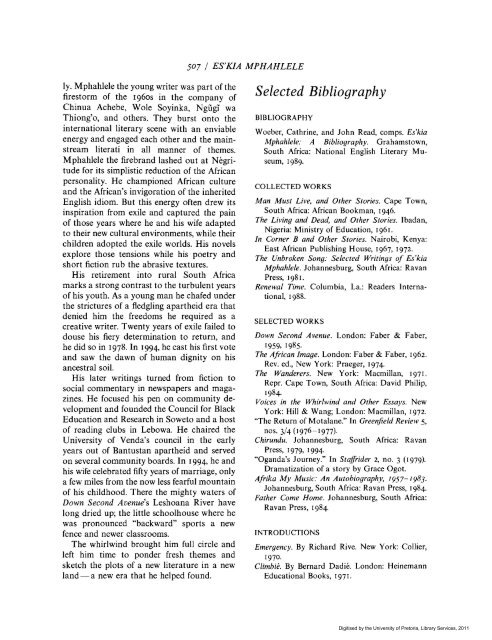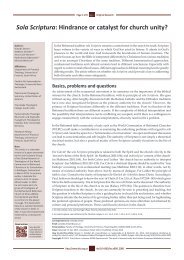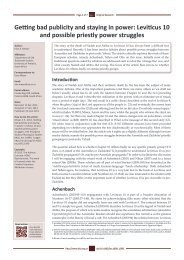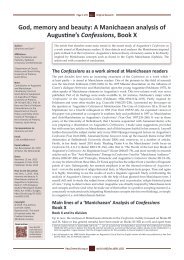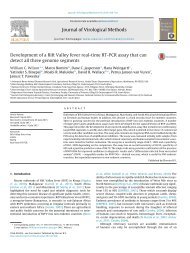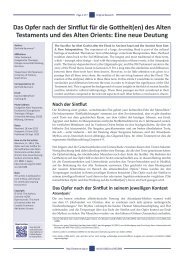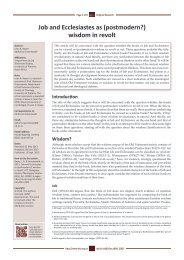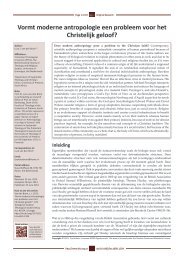Es'kia Mphahlele - University of Pretoria
Es'kia Mphahlele - University of Pretoria
Es'kia Mphahlele - University of Pretoria
You also want an ePaper? Increase the reach of your titles
YUMPU automatically turns print PDFs into web optimized ePapers that Google loves.
ly. <strong>Mphahlele</strong> the young writer was part <strong>of</strong> the<br />
firestorm <strong>of</strong> the 1960s in the company <strong>of</strong><br />
Chinua Achebe, Wole Soyinka, Ngfigi wa<br />
Thiong'o, and others. They burst onto the<br />
international literary scene with an enviable<br />
energy and engaged each other and the mainstream<br />
literati in all manner <strong>of</strong> themes.<br />
<strong>Mphahlele</strong> the firebrand lashed out at Negritude<br />
for its simplistic reduction <strong>of</strong> the African<br />
personality. He championed African culture<br />
and the African's invigoration <strong>of</strong> the inherited<br />
English idiom. But this energy <strong>of</strong>ten drew its<br />
inspiration from exile and captured the pain<br />
<strong>of</strong> those years where he and his wife adapted<br />
to their new cultural environments, while their<br />
children adopted the exile worlds. His novels<br />
explore those tensions while his poetry and<br />
short fiction rub the abrasive textures.<br />
His retirement into rural South Africa<br />
marks a strong contrast to the turbulent years<br />
<strong>of</strong> his youth. As a young man he chafed under<br />
the strictures <strong>of</strong> a fledgling apartheid era that<br />
denied him the freedoms he required as a<br />
creative writer. Twenty years <strong>of</strong> exile failed to<br />
douse his fiery determination to return, and<br />
he did so in 1978. In 1994, he cast his first vote<br />
and saw the dawn <strong>of</strong> human dignity on his<br />
ancestral soil.<br />
His later writings turned from fiction to<br />
social commentary in newspapers and magazines.<br />
He focused his pen on community development<br />
and founded the Council for Black<br />
Education and Research in Soweto and a host<br />
<strong>of</strong> reading clubs in Lebowa. He chaired the<br />
<strong>University</strong> <strong>of</strong> Venda's council in the early<br />
years out <strong>of</strong> Bantustan apartheid and served<br />
on several community boards. In 1994, he and<br />
his wife celebrated fifty years <strong>of</strong> marriage, only<br />
a few miles from the now less fearful mountain<br />
<strong>of</strong> his childhood. There the mighty waters <strong>of</strong><br />
Down Second Avenue's Leshoana River have<br />
long dried up; the little schoolhouse where he<br />
was pronounced "backward" sports a new<br />
fence and newer classrooms.<br />
The whirlwind brought him full circle and<br />
left him time to ponder fresh themes and<br />
sketch the plots <strong>of</strong> a new literature in a new<br />
land - a new era that he helped found.<br />
507 / ES'KIA MPHAHLELE<br />
Selected Bibliography<br />
BIBLIOGRAPHY<br />
Woeber, Cathrine, and John Read, comps. <strong>Es'kia</strong><br />
<strong>Mphahlele</strong>: A Bibliography. Grahamstown,<br />
South Africa: National English Literary Museum,<br />
1989.<br />
COLLECTED WORKS<br />
Man Must Live, and Other Stories. Cape Town,<br />
South Africa: African Bookman, 1946.<br />
The Living and Dead, and Other Stories. Ibadan,<br />
Nigeria: Ministry <strong>of</strong> Education, 1961.<br />
In Corner B and Other Stories. Nairobi, Kenya:<br />
East African Publishing House, 1967, 1972.<br />
The Unbroken Song: Selected Writings <strong>of</strong> Es' kia<br />
<strong>Mphahlele</strong>. Johannesburg, South Africa: Ravan<br />
Press, 1981.<br />
Renewal Time. Columbia, La.: Readers International,<br />
1988.<br />
SELECTED WORKS<br />
Down Second Avenue. London: Faber & Faber,<br />
1959, 1985.<br />
The African Image. London: Faber & Faber, 1962.<br />
Rev. ed., New York: Praeger, 1974.<br />
The Wanderers. New York: Macmillan, 1971.<br />
Repr. Cape Town, South Africa: David Philip,<br />
1984.<br />
Voices in the Whirlwind and Other Essays. New<br />
York: Hill & Wang; London: Macmillan, 1972.<br />
"The Return <strong>of</strong> Motalane." In Greenfield Review 5,<br />
nos. 3/4 (1976- 1977).<br />
Chirundu. Johannesburg, South Africa: Ravan<br />
Press, 1979, 1994·<br />
"Oganda's Journey." In Staffrider 2, no. 3 (1979).<br />
Dramatization <strong>of</strong> a story by Grace Ogot.<br />
Afrika My Music: An Autobiography, 1957-1983.<br />
Johannesburg, South Africa: Ravan Press, 1984.<br />
Father Come Home. Johannesburg, South Africa:<br />
Ravan Press, 1984.<br />
INTRODUCTIONS<br />
Emergency. By Richard Rive. New York: Collier,<br />
1970 .<br />
Climbie. By Bernard Dadie. London: Heinemann<br />
Educational Books, 1971.<br />
Digitised by the <strong>University</strong> <strong>of</strong> <strong>Pretoria</strong>, Library Services, 2011


